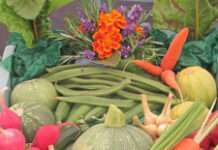K-State food science expert shares tips for eating more healthfully
MANHATTAN, Kan. – Eating right and being healthy means something different to each person.
“There is no one-size-fits-all approach to what we eat,” said Kansas State University food scientist Karen Blakeslee. “Every person has their own personal nutrition needs because of health goals, family backgrounds, bodies and taste.”
Blakeslee is encouraging consumers to be creative in choosing healthful foods during March, which is recognized by the Academy of Nutrition and Dietetics as National Nutrition Month.
The theme for this year is ‘Personalize Your Plate.’
“Consider foods that are nutrient-rich to get the most nutrition in every bite,” Blakeslee said. “Any kind of lifestyle change to incorporate healthy food choices will be beneficial in the long run. It doesn’t have to be bland, boring or even complicated. Make the changes to fit your personal plate.”
Blakeslee urges consumers to consult with a physician if they have health conditions that require specific nutritional needs.
“For some, the help of a registered dietitian can guide them in the right direction,” she said. “But the messages of eating more fruits and vegetables, switching to whole grains and choosing lean proteins still apply. Make one change at a time for best success and you may find some new foods that you enjoy.”
One benefit of consumers staying at home more over the past year is that they have been able to more easily plan and control the food and portion sizes they eat. But as more options for dining away from home begin to open up, Blakeslee said it is important to remain focused on your nutrition goals.
“Choose a restaurant that has many options and look for the healthier options,” she said. “If possible, order the lunch size or child size portions. Many restaurant portions are large, so split it with a friend or take half home for a lunch the next day. At work, packing your own meals and snacks can help get you through the day on your own terms.”
Blakeslee, who is also coordinator of K-State’s Rapid Response Center for food science, publishes a monthly newsletter, called You Asked It!, that addresses many issues related to healthy eating and food safety.
More information on human nutrition also is available online from K-State Research and Extension.
FOR PRINT PUBLICATIONS: Links used in this story
National Nutrition Month (Academy of Nutrition and Dietetics), https://www.eatright.org/food/resources/national-nutrition-month/toolkit
Rapid Response Center for food science, www.rrc.ksu.edu
You Asked It! (newsletter), www.rrc.k-state.edu/newsletter/index.html
Human nutrition (K-State Research and Extension), www.rrc.k-state.edu/nutrition/index.html
K State Research and Extension is a short name for the Kansas State University Agricultural Experiment Station and Cooperative Extension Service, a program designed to generate and distribute useful knowledge for the well being of Kansans. Supported by county, state, federal and private funds, the program has county extension offices, experiment fields, area extension offices and regional research centers statewide. Its headquarters is on the K State campus in Manhattan. For more information, visit www.ksre.ksu.edu. K-State Research and Extension is an equal opportunity provider and employer.
Story by:
Pat Melgares
785-532-1160
[email protected]
For more information:
Karen Blakeslee
785-532-1673
[email protected]





